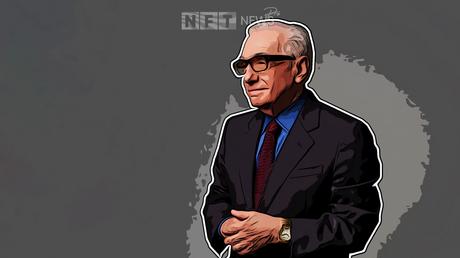
A prominent producer has claimed that NFT Movie Financing could break the monopoly of major Hollywood studios and distribution platforms and bring much-needed originality, diversity and innovative back to the movie business.
Hollywood is facing a direct challenge from Web 3 startups that are harnessing the power of blockchain tech, and the present situation may see a wave of disruption in how movies are financed, distributed, and shown.
This week’s episode of Yahoo Finance’s The crypto mile spoke with Niels Juul, the executive producer of Hollywood films directed by the likes of Martin Scorsese and Michael Mann.
Juul has produced films like The Irishman, Silence and the Enzo Ferrari biopic starring Adam Driver.
Robert De Niro and Al Pacino pose backstage with their award for Best Ensemble Performance for “The Irishman,” produced by Niels Juul. Photo: Danny Moloshuk/Reuters
With the rise of NFTs, blockchain solutions, and cryptocurrency, the transactions threaten the traditional structures of the art world, global finance, and the music industry.
But currently the winds of change have turned to the strongholds of the film industry, with many analysts predicting that blockchain tech will shape the future of how movies are produced, distributed and shown.
By the formation of NFT Studies a Decentralized autonomous Organization (DAO), Niels is a pioneer in bringing NFT innovations and blockchain tech to the film industry.
The Hollywood producer describes how these innovations are changing the meaning of film producer, financier, distributor and consumer.
With the rise of crypto communities coalescing around memecoins such as shiba inu and NFTs as Bored Apes Yacht Club, Juul emphasized the significance of developing community-based film projects.
It has developed NFT Studios as an independent, decentralized organization structure which could “enable the community to seamlessly engage with participating members in shaping and making the movies they want to see, plus getting the benefits of having NFTs associated with them.”
The executive producer criticized main studios for stifling creativity and diversity of ideas in content production, because of a risk-averse attitude and the fact that studio overheads have risen to the point where they only consider a high-level concept to be released. It is considered a “safe bet”. Productions, or reboots of material which now has a fan’s bace.
He stated: “I have many producer friends with fascinating material and perfect scripts of the kind of movies, which would be made in the past, such ad Kramer vs Kramer, or The Usual Suspects, or any of these perfect quality movies which they fight with today. There is a lot of work to do.
“This because the studio costs are too high for them to “fool around” on a $10 M, $15 M, or $20 M movie.
“Due to this, there is a great need to disrupt the film financing model.”
The producer of hit Martin Scorsese movies such as Silence and the Irishman says the monopolization of streaming content by the major four platforms: Netflix ( NFLX ), Amazon Prime Video ( AMZN ), Disney+ ( DIS ) and Apple TV ( AAPL ) is a problem as well.
“Though I’ve cooperated with Netflix and Amazon, the main four streaming players are just concentrated on chasing the biggest market share,” he added.
Thus, the decision about what content the public can see is in the hands of these four companies.
“Actually, these companies are setting the world’s cultural agenda, that is why content production these days has become a monopoly, not only a financial monopoly, but more importantly, and more frighteningly, a monopoly cultural.”
He argued that as the “big four” obsessed with their bottom line at the expense of audiences experiencing a deficit of original and innovative voices, a middle ground must be found.
He explained the growing NFT market as a middle ground where filmmakers and creatives could meet audiences who aim to finance what they want to see.
“And to me, that is the appealing thing about cryptocurrencies, it presents a new chance, a new way to not just revolutionize the way things are financed, but also to change the agenda culturally in a way that we do not it’s only being the last result of the Excel spreadsheet”, he added.
Actor Robert De Niro poses backstage with director Martin Scorsese after accepting the Sonny Bono Visionary Award for The Irishman. Photo: Mario Anzuoni/Reuters
In this week’s episode of Yahoo Finance’s The Crypto Mile, Niels Juul said that the producer’s role is primarily to seek financing for a film.
“Actually 85 percent of my time is chasing money,” he said, “so the financial market for independent films has dried up significantly over the last 5 or 10 years, studios began to concentrate just on the big Marvel franchises.” .

“The Independent film market was nearly destroyed.”
He went on to say that the lack of original independent film content was one of the motivations behind the creation of NFT Studios, which attempted to address the imbalance by using the power of blockchain tech.
“So in response to this, we were looking at new ways of financing when my friends said, ‘have you heard of NFTs?” Jull added.
“I thought it could be a new way to finance films and a way to create a community which could come together around a film.”
“So my partners and I began discovering new ways to finance films via NFT and created NFT Studio.”
Pre-sale NFTs, which lower the barrier to entry to film financing, could democratize the filmmaking process.
Blockchain’s transparency and immutability could return power to the artists and creatives who produce the content, as well as bring efficiency to the production process by cutting out multiple middlemen in the film industry’s supply chains.
Tokenizing the pre-production of movies and selling NFTs which can give anyone ownership and a share of the movie’s profits could turn the whole movie industry upside down.
In addition, movie NFTs could have a collectability factor, allowing owners to become part of a unique community of people who have a piece of a movie, and could also have secondary sales value.
Leave this field empty if you're human: